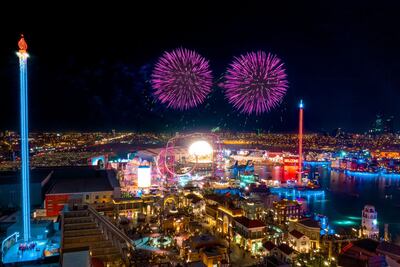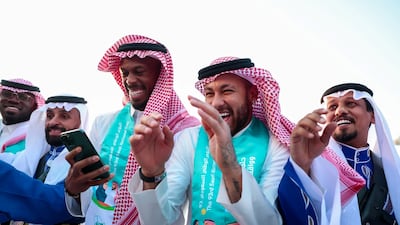“Ahlan wa sahlan [welcome], nawartina [pleased to have you in] Riyadh.”
The greeting to tourists at Riyadh airport comes from two young Saudi men working as hospitality agents, one wearing a thobe and shimag – the traditional white robe and red-and-white-checked head covering – and the other in Yeezys, cargo pants and T-shirt with a map of Saudi Arabia on it.
It's a fair representation of youth in Saudi Arabia today – strongly rooted in their own culture while embracing others.
It is also a sign of the transformation in the kingdom since Crown Prince Mohammed bin Salman, 38, launched Saudi Arabia's Vision 2030 plan six years ago, ushering in a new era not just for the economy but for the mostly young population. Saudis now are choosing to stay in the kingdom as opposed to going abroad – a dramatic shift in attitude and thinking.
The change is reflected on the streets of the Saudi capital as well. Outside Riyadh's airport, a group of Saudi and foreign football players are waiting for their cars – a reminder that this is the city that stars such as Cristiano Ronaldo and Neymar now call home.

Along with international football stars, luxury brands, international businesses and restaurants have all set up base in Riyadh.
The city of nearly eight million people is not just the kingdom's financial centre, it is also a major leisure hub. Preparations are under way for the fourth edition of Riyadh Season – a five-month celebration of art, luxury and entertainment events that kicks off later this month.

Celebrity sightings are becoming the norm in the kingdom as it draws increasing numbers of tourists – one of the goals of Vision 2030. Saudi Arabia attracted 16.5 million visitors from abroad last year.
Riyadh hosted an event to mark the United Nations World Tourism Day on September 27 at which Hollywood actor Winston Duke, known for his role in Black Panther and other Marvel films, was announced as the Ambassador for Responsible Tourism.
The diverse and changing atmosphere in Riyadh is noticeable even in daily life. Among the crowd clustered outside a new Greek yoghurt stand near King Saud University are women who choose to not wear the once mandatory abaya and others who prefer to remain covered head-to-toe in the black robe, while their young daughters are clearly fans of K-pop, a huge influence on young Saudis, with purple streaks in their hair and anime stickers on their phones.
"I love K-pop. I attended Blackpink's concert in Riyadh – it was my dream come true. I am even learning Korean on YouTube," says Reem Alabbad, 14.
The university, meanwhile, a 10-minute walk away, is hosting the Riyadh International Book Fair, where more than 1,800 publishing houses their books on display. Oman is the guest of honour at the 10-day event, which is expected to welcome more than a million visitors.
More than 200 readings, seminars and workshops will be held by the time the fair closes on October 7.
At the exit, a young Saudi woman wearing a beige jacket and trousers bids farewell to departing visitors.
"There's an iced coffee stand outside if you're feeling hot. I hope you enjoyed your time and will visit us soon," she says with a smile.
"Nawartina."







